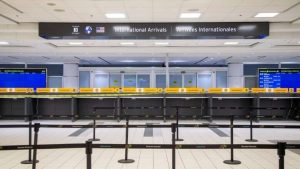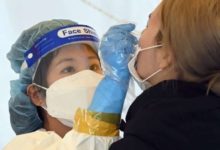With just 141 tickets issued, PHAC says most travellers are following quarantine laws

Only a small percentage of Canadians have been fined for flouting quarantine rules since the federal government brought in strict measures last year, says the Public Health Agency of Canada.
Airlines suspending certain flights, Ottawa introducing quarantine hotel stays to discourage travel
While international travel has nose-dived in the last year, millions of travellers have entered the country since March, when the federal government first brought in measures to curb the flow.
Of the more than two million travellers who have had to legally quarantine, law enforcement agencies have followed up with at least 48,682 of them, as of Jan. 26, said the agency.
The government said the vast majority, nearly 99 per cent, have complied with quarantine requirements.
PHAC spokesperson Tammy Jarbeau said over the last 10 months, police across the country have issued at least 141 contravention tickets and laid eight summary conviction charges under the Quarantine Act. Those charged face penalties of up to six months in jail and/or fines of up to $750,000.
Police have also recorded at least 221 verbal warnings and 23 written warnings.
Jarbeau cautioned that their numbers might not capture the whole picture since it’s up to local police detachments to pass on data to the federal government.
The updated figures come as the federal government prepares to implement stricter surveillance measures.
The federal government said it has been contacting about 6,500 travellers a day, through either live-agent or automated phone calls, to check if they are following the mandatory isolation rules. If officials have reason to believe someone isn’t complying, or if they are unable to reach the traveller in question, PHAC can request a follow-up by law enforcement.
The health agency said it is now training employees at four security companies (Canadian Corps of Commissionaires, G4S Secure Solutions Ltd., Garda Canada Security Corporation (GardaWorld), and Paladin Risk Solutions) to complete compliance checks in 35 cities. The new screening officers will visit travellers’ quarantine locations to confirm that travellers are complying.
The compliance officers will be able to issue verbal warnings but any cases that warrant a stronger enforcement action will be referred to the health agency which can refer the case to law enforcement for follow-up.
A pilot was launched in Montreal and Toronto last week, with a national roll-out “in the weeks ahead,” according to the federal government.
“We can have an added layer of assurance that people are observing that quarantine,” said Chief Public Health Officer Dr. Theresa Tam on Friday.
“There’s an opportunity to engage and make sure they are safely quarantining.”
New quarantining measures coming soon: Ottawa
Stricter quarantine measures for air travellers are also coming, possibly as early as this week.
Last week Prime Minister Justin Trudeau announced that mandatory PCR testing would soon be required for people returning to Canada, on top of pre-departure test requirements implemented earlier this year.
Travellers will then have to wait up to three days at a government-approved hotel for their results, which the government has said could cost about $2,000 to cover food, cleaning and security,
Those who test positive will be required to quarantine in designated government facilities to make sure they’re not carrying variants of the coronavirus, while those who test negative will be able to finish their quarantine period at home.
Most of the people who cross into Canada are actually exempt from quarantining, largely because they are considered essential workers.
The Canada Border Services Agency said between March 31, 2020 to Jan. 24, close to 8.7 million travellers came to Canada, of which 74 per cent were exempt from the 14-day quarantine measures. CBSA said the term “traveller” doesn’t mean separate individuals and a person could cross several times and be counted each time
Half of those entries, about 4.3 million, were truck drivers at the land border, said the border agency.
However, just a small percentage of air travellers have been exempt. The CBSA said about nine per cent of air travellers fall under the exempt list, the majority of them being part of the trade or transport sector, including aircrew.








Redes Sociais - Comentários